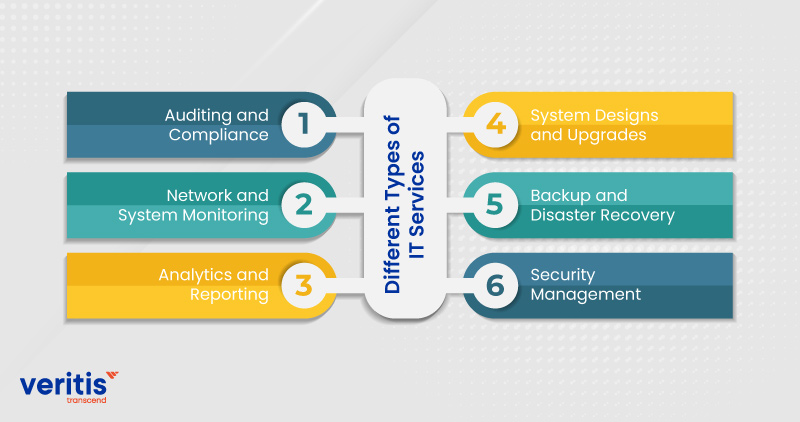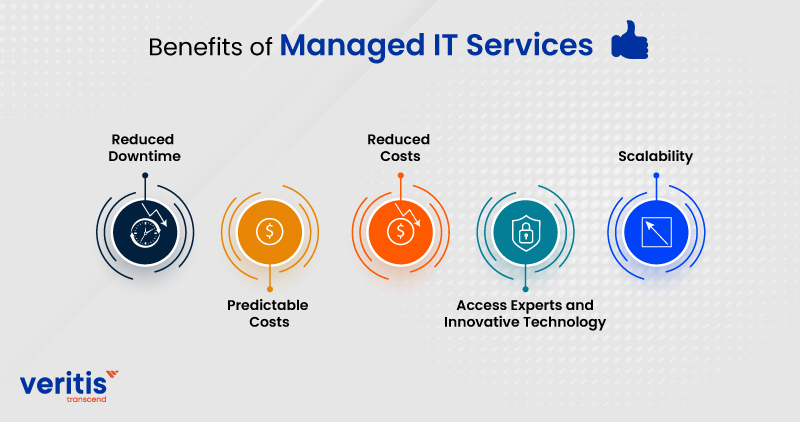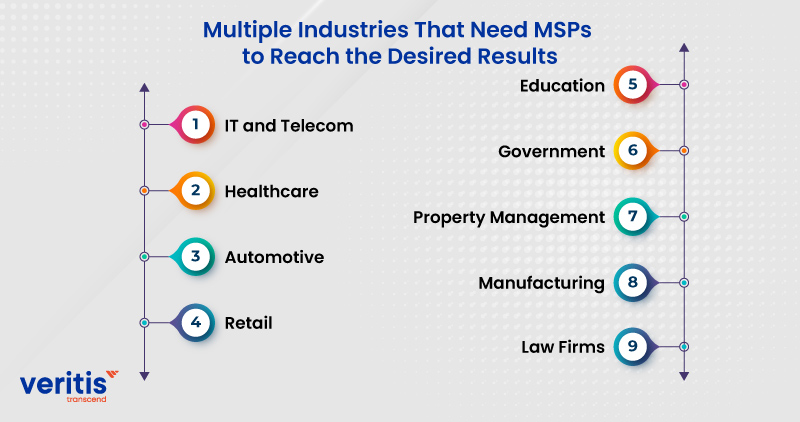
Every industry is transforming rapidly on par with the fast-emerging IT advancements. Organizations strive to adopt relevant technology solutions and services to gain a competitive edge. Moreover, digital transformation is another essential transition that organizations eagerly seek in the near or long term.
All these efforts aim to achieve market sustainability and competence, and IT is getting a due emphasis in the process. However, as companies increasingly rely upon innovative solutions like IoT and the implementation of digital initiatives, a third-party service provider or Managed Service Provider (MSP) becomes imperative to drive IT success.
The advancement of vital operations depends on the efficient management of IT infrastructure. In this sense, managed IT services for small businesses can significantly assist. Most IT infrastructure leaders are ecstatic about the possibilities of sophisticated IT infrastructure managed services, but they are proceeding cautiously.
Companies must run their solutions as effectively as possible to be competitive because downtime can harm a company’s productivity and reputation. The good news is that you can quickly get total control over your IT operations without building a sizable in-house team of specialists by opting for managed IT services.
By implementing the newest and most cutting-edge technology, IT leaders worldwide must strictly control rising IT costs. Companies must manage their application portfolios effectively to maintain run-the-business operations while reducing inefficiencies and redundancies. This will lower the total cost of ownership, free up capital for innovation, and give them control over applications to concentrate resources on expanding the business.
What is Managed IT Services?

Managed IT services is a method of handing off an organization’s IT operations to a third party known as a Managed Service Provider (MSP). These expert third-party companies handle the entire IT operation of an organization. They offer various services, including security, data backups, round-the-clock monitoring, and on-demand help. Additionally, some businesses demand that MSPs supply them with hardware, including servers, networks, PCs, and other storage systems.
Technology provides many solutions for current business operations but also poses challenges for business owners. For networks and other technology to function at their best, continual maintenance, repairs, and strict security measures are required. With the limited resources available to small enterprises, managing all these facets is not practical. For these companies, managed IT service provider fills in the gaps.
A wide variety of crucial measurement, administration, and monitoring tasks are completed by managed IT service company. They relieve internal teams, managers, and company owners of some of their responsibilities by handling the following:
- Cybersecurity
- Compliance
- End-user Support
- Communications Networks
- Data center solutions
- Network administration and security
- Asset and device management
- Data backup and disaster recovery
- Cloud Computing
Different Types of IT Services

The main focus of managed services is outsourcing IT services like cloud computing, security, hosting, etc. A few additional IT services offered by MSPs include the following:
1) Auditing and Compliance
Organizations without the necessary skills struggle hugely with compliance. MSPs may assist organizations in reducing the risks associated with their client data, payment information, documents, and other sensitive information by being very aware of all the compliance regulations.
2) Network and System Monitoring
Monitoring networks and systems is a time-intensive task for organizations. MSPs can take on this responsibility through a remote monitoring and management platform. This aids organizations in concentrating on other crucial areas while maximizing performance and minimizing losses.
3) Analytics and Reporting
Organizations can assess their network performance and other KPIs with the assistance of MSPs, who regularly give analytics and reports. In addition, they can offer independent analyses of the organization’s workflows and even make recommendations for improving them.
4) System Designs and Upgrades
MSPs collaborate with businesses to comprehend their particular requirements and achieve their business goals. They stay abreast of all emerging market trends and technological advancements to ensure that updates are carried out regularly, and the businesses remain ahead of their competitors.
5) Backup and Disaster Recovery
MSPs actively secure an organization’s data security and integrity by constantly implementing sufficient backups and enabling easy data recovery in a catastrophe.
6) Security Management
Defending an organization against cyberattacks is another crucial function of MSPs. Therefore, they offer frequent software patching, upkeep, and other managed IT security services.
Useful link: Difference Between Managed Services Vs Professional Services
Benefits of Managed IT Services

1) Reduced Downtime
Equipment malfunctions, including those involving computers, servers, and electrical systems, frequently cause downtime. Unintentional human error also contributes significantly to downtime, and there is limited action a company can take to prevent it. Consequently, it is crucial to establish robust measures to reduce these risks.
A team working in-house might not have the resources or expertise to effectively manage to decrease the risks of downtime because it is a complex task. MSPs can reduce costs associated with downtime by avoiding it in the first place. In addition, they help businesses adopt proactive management techniques for critical systems instead of reactive ones.
2) Predictable Costs
MSPs automate systems and processes, providing firms with predictable costs. They automate regular operations, reduce the risk of human errors, and deliver services more efficiently using various tools and technology. In addition to defining the service level offered and promptly resolving any faults, adhering to service level agreements (SLAs) increases predictability.
3) Reduced Costs
When a company starts from scratch, the upfront costs of employing and training staff while paying for managed IT service company and other equipment simultaneously can be pretty expensive. Therefore, it makes perfect sense for entrepreneurs to hire MSPs. By using managed services, even established organizations can reduce their costs. The costs of keeping an internal IT crew are relatively substantial. As a result, many IT teams are currently overworked and understaffed, which inhibits them from meeting deadlines and completing crucial tasks on time. MSPs cover the price of IT training so that business owners won’t have to worry about IT specialists leaving their positions.
MSPs can help clients save significant money over time since they eliminate the need to hire and pay for IT personnel. In addition, companies can receive solutions that add value by outsourcing IT chores with this type of business model and avoid spending money on rapidly evolving technology.
4) Access Experts and Innovative Technology
Businesses should continually improve the consumer experience to stay ahead of the competition. The key to achieving this objective is to invest in new technological innovations. However, the existing team of an organization may not be comfortable with new and updated technologies, leading to problems such as malfunctioning software, lack of team buy-in, and difficulty using the program.
Working with MSPs eliminates these issues. MSPs have professionals with years of experience in various verticals. These specialists possess the knowledge and experience to advise businesses on enhancing current business processes rather than just fixing them. In addition, good MSPs stay informed about market trends and know how to leverage the latest technologies for their clients.
5) Scalability
A substantial number of staff, coordination, new technology, and tools are required to scale expensive business networks. Without investing in resources or recruiting additional staff, MSPs enable organizations to scale back when some resources are no longer required. They also enable them to accept new requests and improve or extend systems as needed. As a result, they can help firms remain adaptable and make quick changes that an internal workforce may find challenging. In addition, businesses have better visibility into the trends in their resourcing and growth due to the additional layer of management and monitoring given by MSPs.
Useful link: Managed IT Services for Law Firms: Importance and Benefits
Multiple Industries That Need MSPs to Reach The Desired Results:

MSPs help organizations plan their IT implementations and related budgets in a more organized manner, thus contributing to productivity and cost savings. Here are a few industries that need MSPs to reach the desired results:
1) IT and Telecom
These industries typically operate between critical infrastructure and communication systems that need a robust setup to avoid downtimes. Moreover, they have room for IoT, cloud managed IT services and other core IT applications. All these processes demand strict monitoring, infrastructure management, analytics, and reporting abilities within the organization to deliver desired results.
That’s where MSPs come into action, promising effective management, upgrading, and scaling resources and efficiencies to the changing demands. Then, they go beyond management and create roadmaps for new revenue streams leading to higher productivity and effective resource utilization.
2) Healthcare
Increasing adoption of Electronic Health Records, rising data volumes, and eventual demand for devices, storage, and networks to manage critical functions make Healthcare one of the important markets for MSP.
Healthcare providers are increasingly thriving on innovative solutions like IoT, information systems, and remote consulting, among others, to ensure advanced healthcare.
Eventually, they would require MSP support to operate their IT environment effectively and seamlessly. MSPs hold strong abilities in offering risk management and predictable solutions, which augur well for the industry.
Useful link: Cloud Computing in Healthcare: Looking for Security Advantage?
3) Automotive
Automotive has been one of the critical adopters of advanced technology solutions and managed IT security services. In recent years, automotive has massively adopted innovative solutions and IoT-enabled devices to make automotive and infotainment systems smarter than ever.
Navigation apps, emergency communication, intelligent alerts, and more applications speak about the technology utilization of the automotive industry. For all these to perform at the desired level, an MSP would help record, analyze and ensure communication among the systems.
4) Retail
The retail industry is increasingly thriving on intelligent solutions to capture customer preferences. AI and machine learning algorithms are crucial in offering efficient data insights on consumer behavior. Amid this scenario, a retail player needs to ensure security guidelines for safeguarding consumer data they have or retrieve when a customer land on their website.
Beyond this, customers transact on your channel, which requires a safe and secure payment interface. More aspects of customer engagement and satisfaction stand crucial to the success of an online retail player.
An MSP market experience and subject-matter expertise can help you offer seamless managed IT services for small businesses and stay updated on the changing trends through the right IT strategy.
5) Education
The COVID-19 outbreak has triggered a change in the way the education sector operates. It has given rise to intelligent education, providing particular room for technology implementation in the education sector.
Moreover, educational institutions are embracing digital initiatives like cloud managed IT services, cloud-based learning methodologies, online attendance, digital records creation, and more. All these indicate a new direction for the education sector. And Managed Services Provider (MSP) will naturally have a crucial role in ensuring seamless operations through IT infrastructure managed services maintenance, monitoring, and right IT implementation.
MSP keeps your software updated and ensures your online records’ safety.
6) Government
Government is another area where Managed IT Service Providers will have strong business potential. The MSP demand in the government sector is evident, given the intelligent initiatives that governments are adopting globally to store citizen records, roll out schemes, manage beneficiaries, and more.
E-Governance lays the foundation for MSP requirements in government functioning for IT network management, implementing intelligent solutions, maintenance, monitoring, and other core IT initiatives.
Useful link: Guide to Digital Transformation Technologies and Their Business Impact
7) Property Management
Realty and property management are two other crucial areas that require MSP support. A perfect MSP can handle your communications and networks while also troubleshooting issues as and when they arrive. In addition, handing over IT responsibilities to an MSP offers you scope to focus on core business objectives.
8) Manufacturing
Mission-critical operations are one primary reason driving the manufacturing sector towards intelligent solutions. As a result, manufacturing units/factories have increasingly adopted IoT-like solutions for better connectivity among different internal processes.
Cloud solutions made their foray into the sector, helping it in data operations. Moreover, the sector is looking for advanced technologies like AI and ML to automate critical operations with the changing market trends. Thus, an MSP would greatly help the sector, given its growing technology adoption.
9) Law Firms
With the changing market scenario, law firms are also increasingly using cloud managed IT services to store, transmit and share confidential data. But, in the process, they are naturally prone to data security risks from their competitors or cyber-criminals doing business out of such theft activities. So, law firms must safeguard their data through efficient risk management.
This is where MSPs can help prepare and implement a robust security roadmap for data safety.
In Conclusion
A Managed Service Provider (MSP) is crucial to every industry in driving an effective IT implementation. An MSP handles your systems, networks, and devices, driving your business with technical support. Risk management, upgrading systems, avoiding downtime, and reducing time to market are many other crucial advantages that an MSP promises! Are you looking for a Managed IT service provider? Veritis, Stevie Award winner, offers expert guidance and innovative solutions to businesses of all sizes. From risk management to upgrading systems, we drive effective IT implementation, reduce downtime, and accelerate time to market. Contact us for customized solutions that align with your business objectives.
Got Questions? Schedule A Call
Also Read:
- 9 Ways Managed IT Services Help Your Business
- 12 Best Features for Work Management Software That Matter Most
- All You Need to Know About How Digital Transformation Managed Services Accelerate Business
- Managed IT Services To Be ‘USD 329 Bn’ Market by 2025
- Why ‘Managed IT Services’? Top-9 Reasons To Choose A ‘Managed IT Services’ Partner
- 9 Keys to Selecting a Right Cloud Managed Services Provider (MSP)